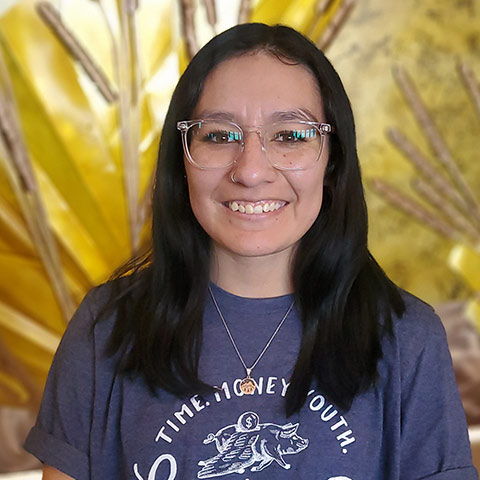Post-BSN to DNP
M.S. Nursing and DNP Dual Degree
Earn your master's and doctorate in one program.
The increasing complexity of patient care, the volume of knowledge available today, and the very important need for the profession of nursing to help guide the future of health care policy and practice mean that it’s critical for nurses to advance beyond the master’s level. This is an important time for health care policy in this country, and an important time for the profession of nursing.
Your DNP will prepare you to elevate nursing to the next level and make a meaningful and positive impact. Be at the forefront of emerging roles and complete population-focused applied research with your selected patient population as part of the DNP program. Graduates are awarded both the Master of Science (MS) in Nursing and the DNP upon successful completion of all requirements.
Ready to apply? See how
Ezzie Baltierra-Chavez, Assistant Director of Enrollment
Hear from Ezzie as you explore college options. We’ll send details on scholarships, deadlines and financial aid.
Master's Studies
Master's-level courses are taught through classroom instruction or web-based synchronous classroom participation. A total of 630 clinical hours are required for the M.S. portion of the program. Upon completion of the master's course work, students can progress directly into the doctoral program. Students also have the option to pause their enrollment for a year, which allows them to pursue board certification as a nurse practitioner, increasing their earning potential before they begin their doctoral studies.
Master's Specializations
Doctoral Studies
The final years of the program include online DNP courses with no on-campus requirements. This flexible format allows you to work as a nurse practitioner while you earn your DNP. Students are required to take core nursing courses at both the master's and doctoral levels. Clinical hours for the two programs total 1000.
Doctoral Specializations

Advanced Leadership in Health Care (ALHC)
The DNP with the ALHC specialization is for those with a background in nursing leadership. By becoming a leader in our nursing community, you’ll go on to help improve the practice of nursing and patient outcomes, while strengthening health care delivery overall.

Advanced Practice Registered Nursing (APRN)
The DNP with the APRN specialization is for those with a background as an advanced practice nurse. A DNP degree will increase your level of clinical education and help strengthen your leadership abilities.
How to Apply
To apply directly to the Post-BSN to DNP program, you will need
- Completed online application through NursingCAS
- Select the application for your chosen M.S. (FNP, NNP or PMHNP)
- Nursing bachelor's degree from an NLN or AACN-CCNE accredited program
- Official transcripts sent directly to NursingCAS
- Resume including professional and volunteer experience
- Two-page personal statement per NursingCAS instructions
- Three professional recommendations (one from a current employer or supervisor)
- Admissions interview may be required.
Eligibility:
- Minimum cumulative undergraduate GPA of 2.75 or higher on a 4.0-point scale
- A grade of "C" or better in all undergraduate nursing courses
- Eligibility pending successful completion of drug screening and criminal background check
- Health assessment and physical examination indicating appropriate immunizations and physical ability to meet the objectives of the DNP program
- Additional eligibility requirements are listed on the Application Requirements page
Tuition and Fees
Tuition for the 2025-2026 academic year:
$1,108 per credit hour for doctoral courses
$1,055 per credit hour for master's courses
Total program credits: 74-79 credit hours
Tuition is one part of the overall cost of attendance, which includes all expenses students may have, including basic living costs. For more information about tuition, fees and your estimated cost of attendance, visit the relevant Cost of Attendance pages. Tuition and fees are subject to change.
Additional fees may include background check and drug screen costs, application fees and clinical fees, among others. Credit hours required for program completion are calculated based on the number of clinical hours completed during your master's program.
Regis offers a variety of scholarships, grants and other programs to help you pay for school. Visit Financial Aid for more information.
Admission Deadlines
FNP
Application Opens: Sept. 1
Rolling admissions
Application Deadline: Feb. 1
Program Start: May
NNP
Application Opens: Dec. 1
Application Priority deadline: April 1
Application Deadline: July 1
Program Start: Aug.
PMHMP
Application Opens: Sept. 1
Application Deadline: Feb. 1
Interviews: Dec., Jan., Feb.
Program Start: May
All applications must be received by 11:59 p.m. ET on the application deadline.







